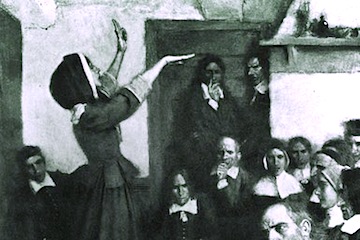Anne Hutchinson and the Puritan Trials
One of the most famous women of colonial Massachusetts was Anne Hutchinson. She was a rare female participant in the theological debates of the colony, and her views resulted in her banishment in 1638. At the heart of her controversy was the idea of salvation through grace. Although a belief in divine grace was the raison d'etre for Protestantism, it was tempered by other elements of the Puritan theology. Her trial became a local sensation and its story has been passed down since.
The communities founded in Massachusetts were religiously exclusive by design. The leaders of the church were the leaders of the colony. Dissidents were asked to change their views, or to leave. Briefly stated, Puritan theology is heavily based on right actions. The church adhered to the doctrine of predestination, meaning that each person's destiny of heaven or hell was an unchangeable fact. It also adhered to the doctrine that no person could know which group they fell into. Action was the evidence of alignment with God. Many diversions were banned by Puritanism, as being distractions from a true focus on the Lord and his works. Examples were drama and religious music.
Anne Hutchinson challenged many of these views. Born in England, she moved with her husband and 11 children to Massachusetts in 1635. She worked as a midwife in the new colony, and in this role she came into contact with many other women of the colony. She provided her opinions about the sermons of other ministers, and this developed into home meetings where women and men alike would sit in a private setting and discourse on religious matters. It was through meetings like this that Hutchinson gained her reputation and drew the attention of colonial authorities.
Hutchinson espoused, among other things, two main heresies that ensured the enmity of the Puritan leaders. Firstly, she preached a doctrine of free grace. In other words, she preached that salvation did not derive from one's actions, but rather to whether they had felt the "divine inspiration" of God. She also claimed to know who was and wasn't part of the elect -- the group destined for heaven. In Puritan theology, it was not possible to know this, even about one's self. To proclaim otherwise was arrogance and heresy. Hutchinson had also been close with other figures in the colony, such as former Governor Henry Vane, who had left the colony in favor of John Winthrop. Winthrop was one of those who most disapproved of Hutchinson, and the political and gender element could have exacerbated the backlash against her theological idiosyncrasies. A trial was held of Hutchinson and other followers, and she won few friends by pronouncing, "Therefore take heed how you proceed against me—for I know that, for this you go about to do to me, God will ruin you and your posterity and this whole state."
Hutchinson was banished from the colony, effective spring of 1638. After leaving Massachusetts, she first went to the bordering colony of Rhode Island, where Roger Williams was establishing a haven for dissidents. She later moved her family to New Amsterdam, then under the control of the Dutch. There she and several of her children were killed in an attack by the Siwanoy in 1643.
Many famous Americans can trace their ancestry back to Anne Hutchinson. Franklin Roosevelt, George H.W. Bush, and George W. Bush are three Presidents to come from her line, and Thomas Hutchinson was the loyalist Governor of Massachusetts Colony in the run-up to the American Revolution.
